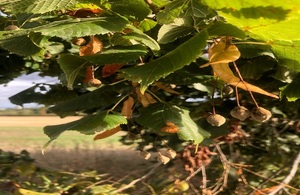Domestic tree seed production to be ramped up with new grant
Domestic tree seed production is to be ramped up with £1.2 million of new Government funding through the Seed Sourcing Grant.

The Seed Sourcing Grant will enhance the quality, quantity and diversity of domestic tree seed sources. (Pictured - Lime seed. Credit: Forestry Commission)
Domestic tree seed production is to be ramped up with new Government funding announced today (Thursday 22 September). The £1.2m Seed Sourcing Grant will boost domestic tree seed production, create green jobs, help meet the increased demand for trees and achieve our ambitious net zero targets.
The grant is designed to enhance the quantity, quality and diversity of tree seed sources in England. Most tree seed planted in the UK is of British origin, but evidence suggests that British seed sources may struggle to meet future demand across all species and there are known to be global shortages of tree seed. The grant will boost domestic tree seed production and support green jobs, helping meet the increased demand for trees and achieve our ambitious tree planting targets.
The Government has re-committed to its net zero targets, and new woodland and tree planting will contribute to those. The Seed Sourcing Grant will help to ensure the availability of planting stock to meet domestic tree planting needs.
The grant also aims to improve the diversity of England’s seed supply, for example by increasing the range of species and provenances available. This will be crucial for creating diverse and resilient woodlands, which are better able to adapt to future climate conditions as well as emerging pests and diseases.
Richard Stanford, Forestry Commission Chief Executive, said:
Seed sourcing is an essential part of tree production and one that can sometimes be overlooked. As planting rates increase, so too will the demand for tree seed.
This funding will give a vital boost to domestic tree seed production, helping to create diverse and thus resilient woodlands across our country. This will both help meet our ambitious tree planting targets and ensure the resilience of woodlands so they can thrive in the uncertain future.
The Seed Sourcing Grant will also reduce the need to buy seed from the international market, lowering the risk of importing harmful pests and pathogens.
Today’s announcement comes as the world’s leading authorities on plant health and biosecurity come together for the world’s first ever International Plant Health Conference to address current and future plant health challenges - including facilitating safe trade and new pest and disease pathways, such as e-commerce.
Nicola Spence, UK Chief Plant Health Officer, said:
Plant health and biosecurity are fundamental to life on Earth and ensuring their continued health and vitality will be critical to a thriving natural environment for future generations.
By increasing and diversifying England’s seed supply, this grant is crucial to help lower the risk of importing harmful pest and diseases by reducing the need to buy seed internationally and will create diverse and resilient woodlands which will be better adapted to future threats.
Eligible activities for the grant include:
- Management of existing seed stands – the groups of trees in the landscape from which seed is collected – to ensure they are productive for seed collectors.
- Desk studies and field studies to identify and bring additional seed stands onto the National Register of Basic material.
- Planning and planting of new seed stands.
-
Planning and planting of new seed orchards – which are planted using seed or clonal material from known parents outside of the natural landscape in an area convenient for seed collectors.
- Some activities will take time to implement, and so multi-year funding will be available up until March 2025.
The grant aims to attract a broad range of applicants, including both organisations already involved in these activities and those who have not previously considered seed sourcing.
To apply now, visit our dedicated page on gov.uk. Closing date for applications is Sunday 13 November 2022. The Forestry Commission will host a webinar on Tuesday 11 October 2022 to help with the application process. Sign up to the webinar here.